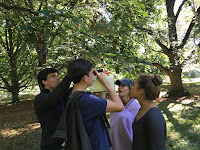Global Ecology Education: Creating a Path to Sustainability & Leadership
Karina Baum, Director of Global Education and US Science Teacher
Global Ecology Education Initiative, Boston University
Buckingham Browne & Nichols
Karina Baum, Director of Global Education and US Science Teacher
Global Ecology Education Initiative, Boston University
Buckingham Browne & Nichols
In our continuing Global Ecology journey, students from my Advanced Biology classes met Dr. Zook at the world-renowned Arnold Arboretum in Jamaica Plain for a three hour field trip experience.
Given that our emerging program theme centers around the importance of key ecosystems such as forests to the current and future health of the biosphere, this experience was designed to familiarize and personalized students with trees and their relevance to the biosphere.
In an introductory walk, we pointed out key features of certain trees and highlighted global ecological concepts such as succession, biodiversity, albedo, adaptive characteristics, and evolutionary history. We engaged students through series of questions, to which they contributed their ideas and thoughts. Indeed, many questions we posed meant to foster thinking and making connections, rather than simply looking for a single word, statement, or fact.
With some tools - hand magnifying lenses, microviewers and some other resources - the students broke into smaller groups. Each team received a series of challenge questions to work on and discuss at different selected trees. Indeed, the student groups had to locate their respective tree by using photo cards depicting different parts of the tree. This fostered immediate physical engagement, curiosity, and student collaboration. Dr. Zook and I then went around to visit the different groups, periodically posing a question or idea and helping to keep everyone focused, albeit always in a non-stressful, experiential learning mode.
Students later gave brief presentations of their tree discoveries based on the challenge questions. This was followed by a full group picnic on the grass near the magnolia trees prior to departure. Initial observations lead us to conclude that learning is greatly enhanced in instances such as this one, where students leave the classroom to directly interact with the studied theme. This seems especially true when concerning a different life form that deserves our respect, fosters ecological kinship, and demonstrates real application to our lives as humans.


























No comments:
Post a Comment